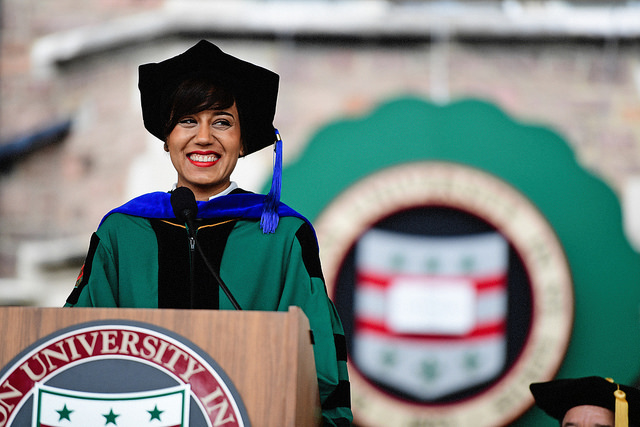Graduate student Ashley Macrander’s message to graduates
Thank you Grand Marshal Drobak, and thank you to everyone who provided me with the opportunity to speak today.
The origination of this speech makes me laugh now, but at its inception I thought I was off to a very inauspicious start. It was immediately after my dissertation defense, and my adviser greeted me following the committee deliberation with: “Congratulations Dr. Macrander, and I’ve got a surprise for you. You will be the first graduate student speaker at Commencement!” My immediate response was: “Shouldn’t we have discussed this first?” Of course, he told me “no.”
After the initial panic attack wore off, I decided to approach this speech as any good graduate student would, with research. I interviewed the people around me — administration, faculty, staff, undergraduate and graduate students about what graduate and professional education at Washington University in St. Louis means to them. Here is what they had to say:
“Graduate education means role models who validate my interests, encourage my studies, and push my passions.” – Rachel Harris, undergraduate student
Every day, graduate students across the university serve as teaching assistants for undergraduate courses. It is in this role that we get to share our enthusiasm for our field of study and help to develop the incredibly talented young minds at WashU into learners who think critically about the world around them. We cheer on their successes and we support them through perceived failures. We are teachers and we are mentors.
When asked about what graduate education meant to him, Dean William Tate of the Graduate School offered, “Discovery is our core mission, and graduate education is the heart of discovery. Supporting this mission daily is a great honor.”
Graduate students from WashU are doing amazing things, and I am humbled to call many of them my friends. Students in medicine and social work are researching cancer treatment and prevention methods. Humanists are exploring the concepts of love and normality, and social scientists are investigating the roles of race, gender and socioeconomic status in educational attainment. Students in economics study media bias while those in earth and planetary sciences examine stardust and the history of the solar system. We are scholars.
Mary Clemens, a master’s student, described her graduate experience in one word: connections. “The connections among topics, authors and ideas in my courses helped me to discover that there can be more than one answer to a question,” she said. “The connections I made with many of my instructors have allowed me to grow in an academic environment. And, the connections I made with my fellow students have been the most meaningful.”
Caroline Merz, a doctoral student, echoed these sentiments, stating, “My faculty adviser has been my rock and a cohort of supportive peers have helped me through some of the toughest classes, research projects, and teaching positions. I can’t imagine myself having gone to graduate school anywhere else. I know WashU was the right choice for me.”
Graduate and professional education is rooted in relationship-building. We seek out relationships in our research to the broader scope of work in our field, we invest in relationships with our advisers, who hone our academic and professional development, and we cherish relationships with our peers. Completing an advanced degree is both one of the most difficult and most rewarding pathways down which we will travel and those who walk with us stay with us forever. We are connected.
Graduate and professional students pursue further education because they desire the ability to positively affect society and their environment. Dean Notaro of the Graduate School stated, “Graduate education is integral to the success of Washington University and to our global society. Graduate students create new knowledge and solve the pressing problems that make our world more vibrant, just, and humane.” We make an impact.
But, perhaps most importantly, we are students. Amy Reynolds, a doctoral student, offered the following quote: “Like many, I came to graduate school convinced that there must have been some mistake about admitting me, and that everyone could tell that I didn’t belong there. Quite apart from milestones and degrees, the accomplishments I treasure most are the ones that mark me as truly, finally belonging: the sense of owning my own voice, of knowing exactly what I have to say, of knowing the value of my contribution and how to best make that contribution. There wasn’t a single moment where I changed from that uncertain first year into the confident and capable scholar I now know myself to be — instead, the journey of that transformation has been the core of my graduate school experience.”
In the process of gathering thoughts from others, I began to reflect on what graduate education at WashU means to me. It means that, though I will never be able to thank my parents enough for all of the support they have given me, I have hopefully made them proud as the first person in our family to earn a PhD. It means that I can play a role in continuing to diversify academia as one of relatively few women of color with a PhD. It means that I have had the privilege to be surrounded by the most brilliant, driven and collegial people that I have ever met, and I recognize how lucky I am to call them my mentors, friends and students. It means I will be forever grateful to everyone at WashU who has had an impact on my life over the last five years. I am a more confident, ambitious and fulfilled person as a result of my time here.
I would like to end with an insight from Dean Nancy Staudt of the Law School. To her, “Graduate education at Washington University is where we are learning together, we are leading together, and ultimately we are changing the world together.”
